Donald John Trump (born 14 June 1946) was President of the United States from 20 January 2017 to 20 January 2021, succeeding Barack Obama and preceding Joe Biden. A famous real estate businessman and reality television personality before entering office, Trump was one of the most controversial presidents in American history. He was elected President as a Republican running on a right-wing populist, nativist, nationalist, and protectionist platform, opposing political correctness, immigration, and the liberal-leaning media while criticizing the presidency of Barack Obama. The 2016 presidential election was rife with allegations of illegal Russian interference and collaboration with Trump's campaign, and Trump was infamous for making several false, controversial, or racist statements. He was one of the first presidents not to use the White House as their primary residence (he mostly lived in Trump Tower), and he revolutionized the use of Twitter as a tool for Presidents to regularly make political remarks or attacks. He was criticized by many on both the left and right for his whimsical decisions, highly controversial comments, and fascistic tendencies as President, and international opinion of the United States shrunk during his presidency. In July 2017, he had an confidence rating of just 22%, and he lost re-election to former Vice-President Joe Biden at the highly-contentious 2020 presidential election despite his attempts to cancel the vote-counting, his refusal to promise a peaceful transition of power, and his premature declaration of victory.
Biography
Early career

Trump in 1987
Donald John Trump was born and raised in Queens, New York City, New York, the son of real estate developer Fred Trump. He received an economics degree from the Wharton School before taking over his family's real estate business in 1971, renaming it "The Trump Organization" and expanding it into Brooklyn and Manhattan. The company built or renovated skyscrapers, hotels, casinos, and golf courses, and he started various side ventures which increased his name recognition; he branched out to own the Mar-a-Lago golf course in Florida and the Bedminster golf course in New Jersey, as well as the Trump Taj Mahal casino in Atlantic City, which closed down due to Trump's declaration of bankruptcy in 2016. He also ventured into reality television as the host of Miss Universe and Miss USA from 1996 to 2015 and as producer and host of The Apprentice from 2003 to 2015, and he co-authored several best-selling books, including The Art of the Deal. He soon amassed a net worth of $3.1 billion from his various business ventures, although the failure of the casino industry in Atlantic City and the failure of his Trump University program cast doubts as to his reputation as a businessman. In addition, the Department of Justice sued him for discrimination against African-American renters in 1973, the first of many racial controversies that Trump engaged in.
Politics
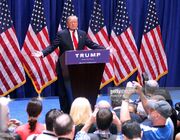
Trump announcing his candidacy for president, 16 June 2015
Trump first registered as a Republican in Manhattan in 1987, but he switched to Reform Party USA in 1999, the Democratic Party in 2001, and back to the Republican Party in 2009. On 1 May 1989, he wrote an op-ed in the New York Daily News calling for the state to seek the death penalty in the Central Park jogger case, accusing the innocent African-American and Hispanic youths of being rapists; he continued to insist that they were guilty even after their 2002 exoneration, causing more suspicion that Trump was a racist.
In 2011, Trump launched his political career when he promoted the racist "birther" conspiracy theory, claiming that President Barack Obama was a Kenyan-born secret Muslim, and he pressured the White House to release Obama's "long-form" birth certificate as proof of his citizenship. That same year, he appeared at the Conservative Political Action Conference, his first political event. On 16 June 2015, he announced his candidacy for President of the United States at Trump Tower, pledging to "Make America Great Again". His campaign was initially underestimated by pollsters, but he beat the sixteen other Republican presidential candidates to secure his party's nomination, doing so after a heated primary in which he bullied the other candidates, such as calling them "Lyin' Ted Cruz" and "Little Marco Rubio", among others. He became known as a right-wing populist by expressing all of his thoughts to Republican voters, who saw him as a genuine and anti-establishment candidate. Trump promised to "drain the swamp" of corrupt establishment politicians, to be the voice of the American people (and the "forgotten people" whom he claimed to represent), to halt the offshoring of American jobs, to build a wall along the US-Mexico border to stop illegal immigration, to deport all illegal immigrants and end DACA, to reduce the national debt, and to introduce extreme vetting and a travel ban on Muslim immigrants and travellers to fight against Islamist terrorism. He ultimately emerged as his party's surprise nominee in the general election, facing off against Democratic presidential nominee Hillary Clinton. On 15 July 2016, he selected Indiana governor Mike Pence as his running mate.
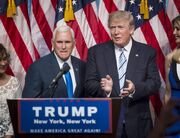
Trump and Mike Pence
During the general election, Trump continued to employ populist rhetoric and ad hominem attacks. He promised to investigate Hillary Clinton's use of a private email server to handle confidential information and her alleged lying about the 2012 Benghazi attack, and he and his supporters adopted the chant "Lock her up" and the moniker "Crooked Hillary". His campaign was supported by Russia's Internet Research Agency and WikiLeaks, which hacked the Democratic National Committee's servers and leaked documents and emails which suggested that the Democratic Party had rigged the primary against Bernie Sanders (a move which led to many Sanders voters abstaining from the election or even voting for Trump), that DNC chairwoman Donna Brazile had broken debate rules by sending the questions to Clinton in advance, and many others. Trump even went so far as to ask Russia to recover the 30,000 deleted emails from Clinton's computer, and he promised that the USA would be closer with President Vladimir Putin and would abandon NATO. He also benefited from an FBI investigation into Clinton's emails, which persisted until the week before the election. Trump himself was the source of controversy due to many controversial comments, such as implying that most Mexican immigrants were rapists and criminals, that Islam was at war with America, and even being discovered to have claimed that, as a rich man, he could "grab (women) by the p*ssy" in an uncovered 2005 clip from Access Hollywood. Trump was met with severe criticism from feminist, civil rights, and progressive groups for his controversial comments, and several top members of his own party, including former presidential nominee Mitt Romney and presidential candidate John Kasich, criticized him. Despite the persistent political and media attacks on Trump, Trump benefitted from Clinton's massive unpopularity, compounded by her generalization of Trump's voters as "irredeemable" and "deplorables", her own FBI troubles, and her inability to connect with young, Rust Belt, southern, and white working-class voters.
Presidency
2016 presidential election
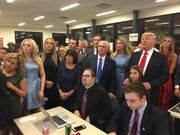
Trump, his family, and staff watching the election results
On 8 November 2016, in one of the most shocking upsets in US history, Trump won the 2016 presidential election with 306 electoral votes to Clinton's 232, although he lost the popular vote by almost 3 million votes. He flipped the "blue states" of Pennsylvania, Michigan, and Wisconsin, capitalizing off of Clinton's decision to not campaign in Wisconsin (taking the state's Democratic history for granted) and campaigning on issues relevant to Rust Belt voters in the Midwest and supporting the declining steel industry in Pennsylvania and Appalachia. Trump was the wealthiest, oldest, and least politically or militarily experienced person to become President.
Tenure
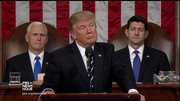
Trump addressing the US Congress, 28 February 2017
During his presidency, Trump ordered an travel ban on citizens from the Muslim-majority countries of Iran, Iraq, Libya, Somalia, Sudan, Syria, and Yemen, and it limited the US' refugee intake in 2017 to 50,000. On 9 February 2017, the executive order was challenged as unconstitutional and rendered unenforceable by the Department of Homeland Security. Ultimately, the US Supreme Court upheld the policy's third revision, which restricted travel from Chad, Iran, Libya, North Korea, Syria, Venezuela, Yemen, and Somalia. He also initiated a tax-cut package for individuals and businesses, allowed oil drilling in the Arctic, authorized the Dakota Access Pipeline to be built through Native American lands, appointed Neil Gorsuch and the highly controversial Brett Kavanaugh to the US Supreme Court, withdrew the United States from the Trans-Pacific Partnership free trade deal, withdrew from the Paris Agreement on climate change, and withdrew from the Iran nuclear deal, leading to the 2019 Gulf of Oman crisis. He also recognized Jerusalem as the capital of Israel and recognized Israeli ownership of the Golan Heights, imposed import tariffs on various foreign goods, triggered a trade war with China which hurt Midwestern soybean farmers and international commerce, started negotiations with North Korea toward denuclearization, authorized airstrikes on Syrian Arab Army installations in retaliation for the use of chemical weapons during the Syrian Civil War, and attempted to overturn Roe v. Wade. From 2017 to 2019, he was again accused of racism for calling the neo-Nazis at the Unite the Right rally "fine people", accusing Haitians, Salvadoran, Honduran, and African immigrants of coming from "sh*thole countries", and saying that no human would want to live in crime and rat-infested Baltimore in a jab at congressman Elijah Cummings.
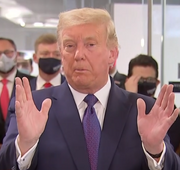
Trump at his campaign headquarters in Arlington, Virginia on 3 November 2020
On 18 December 2019, Trump became the third President of the United States to be impeached by the US House of Representatives, which adopted two charges against him: abuse of power and obstruction of Congress. He was ultimately acquitted by the US Senate, but his poor handling of the COVID-19 pandemic (including his attempted cover-up of the pandemic's severity) and the George Floyd protests led to his continued unpopularity. In November 2020, in an election marked by a large number of mail-in votes, the largest election turnout in US history, heightened tensions between Trump's supporters and the democratic system, and a drawn-out vote count, Trump was defeated by former Vice-President Joe Biden despite winning the crucial swing states of Florida and Ohio, with Biden winning the Republican states of Georgia and Arizona in addition to the swing states of Pennsylvania, Nevada, Michigan, and Wisconsin. Trump prematurely declared victory on election night, demanded a halt to vote-counting in states where he was ahead (while accusing the states in which he lost of rigging the elections), falsely claimed widespread voter fraud, and refused to promise a peaceful transition of power. On 6 January 2021, he delivered a speech at the "Save America Rally" in Washington DC exhorting his followers to march on the Capitol and force the Congress to halt its certification of the election results, resulting in the 2021 United States coup d'etat attempt. Trump's incitement of the coup attempt led to an outpouring of criticism of his authoritarian tendencies, and his incitement of violence led to several social media companies locking his accounts. On 13 January 2021, in a bipartisan vote (backed by 10 Republicans), the US House of Representatives voted 232-197 to impeach Trump for a second time. Trump chose not to attend Biden's inauguration on 20 January, the first President to snub his successor's inauguration since Andrew Johnson in 1869.
Trump then returned to his home in Florida, but he kept his presidential campaign committee active. On 19 January 2021, it was first reported that Trump had expressed interest in forming a "Patriot Party" separate from the GOP, which many of his supporters believed had betrayed him, and the Patriot Party was founded by James Davis on 25 January. Trump's spokesman Jason Miller was quick to distance Trump from the new party, claiming that Trump had no involvement in its formation, and the Republican Party quickly rallied back to Trump lest a populist third party steal its votes.
Trump temporarily left the spotlight after most major social media companies suspended his account in the aftermath of January 6, but Elon Musk's 2022 takeover of Twitter resulted in Trump returning to that platform; however, he mostly used the far-right social media app Truth Social to communicate with his followers. In November 2022, just days after several of his endorsed candidates were defeated in their US Congress bids, Trump announced his intention to run for the presidency in 2024, and he emerged as a clear frontrunner, far ahead of his main challenger Ron DeSantis, whom many Republicans saw as the future of the GOP due to the perceived waning popularity of Trumpism.
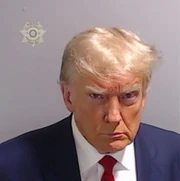
Trump's 24 August 2023 mugshot
2023 saw Trump face several legal troubles: E. Jean Carroll successfully sued Trump for defamation for denying that he had sexually assaulted her, Manhattan District Attorney Alvin Bragg indicted Trump for making hush money payments to Stormy Daniels to cover up his affair during the 2016 presidential election, Special Counsel Jack Smith indicted Trump for his illegal possession of classified documents at Mar-a-Lago, Judge Tanya S. Chutkan oversaw Trump's trial for inciting the January 6 insurrection, and Fulton County district attorney Fani Willis indicted Trump for his attempts to overturn the 2020 presidential election. On 24 August 2023, Trump was booked at the Fulton County jail and released on a $200,000 bond; unlike in the other indictments, Trump received a mugshot which was published to the internet.
| President of the United States | ||
|---|---|---|
| Preceded by: Barack Obama |
2017-2021 | Succeeded by: Joe Biden |
